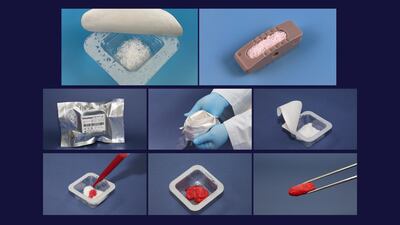
Orthopedics

This week, Establishment Labs Holdings announced the FDA gave it premarket approval for Motiva breast implant, Cologuard lands FDA approval for Cologuard Plus and GE HealthCare gets FDA nod for a new imaging agent. The FDA announces another expansion for TAP into ophthalmology and radiology. The AAMI and CTA will join forces to develop standards for AI and ML-enabled health care products.

The companies intend to co-market Siemens Healthineers’ Multitom Rax as part of Medtronic’s AiBLE ecosystem, which combines advanced technologies in navigation, robotics, imaging, data analytics, and AI to enhance the precision and predictability of spine and cranial surgeries.

This week, Neuralink announced it received US FDA breakthrough device designation for a device to restore sight; medtechs Discure and DeepLook secured new funding; FDA pump recalls from B. Braun Medical and Fresenius Kabi; Axonics prevails in patent infringement lawsuit with Medtronic; Merit Medical buys Cook Medical for $210m.

The US FDA is advising against use of the Zimmer Biomet CPT hip implant after research indicated it may pose a higher risk of thigh bone fracture than similar products.

UK-based Biocomposites will begin selling in the UK its next-generation osteoinductive bone graft substitute, NanoBone, which came with its acquisition of Artoss GmbH in June 2023. Meanwhile, the company has purchased remaining shares in the manufacturers of SYNICEM and Subiton antibiotic bone cements and preformed antibiotic-loaded spacers.

The devices include a digital therapeutic to treat ADHD and a tongue muscle stimulator to prevent sleep apnea and snoring. They all initially reached market via the de novo process and have now been declared class II.

Moximed aims to accelerate adoption of its MISHA Knee System, De Novo-approved by the US FDA in April 2023, with $91m in Series D funding. Chris Gleason, president and chief executive officer, offers perspective on the company’s innovative technology and commercial growth activities.

Caresyntax said it will use the $180m it recently raised in a series C extension and debt financing round to build out its vendor-neutral surgery platform aimed to help surgeons with real-time and long-term decision support to improve patient outcomes and efficiencies.

The nonprofit XLerator Network has announced eight life sciences start-ups, including five medtech concerns, that will benefit from its educational support and other resources. The NIH-funded program is designed to build entrepreneurial skills and promote commercialization of academic technologies in the US Southeast region.

J&J Medtech announced the FDA clearance of its dual-use robotics platform Velys Spine with plans to go to market in the first half of 2025.

The program, which brings together innovators and device industry stakeholders, helps ease the path to market for novel devices.

A recent review of orthopedic device approvals between 2018 and 2022 found that less than 10% of 510(k) devices – and less than 5% of PMA and de novo products – have been authorized for use in children, highlighting the ongoing lack of pediatric devices.

This week, AdvaMed and MITA win appeal to prevent repair companies from hacking medical devices, the FDA cleared Abbott’s Libre Rio CGM for OTC sales, J&J MedTech wins expanded clearance for Velys knee medical robot, the FDA updates its AI program, Canary Speech secures $13m in series A funding and Xeltis won FDA approval for an IDE submission to begin enrolling patients for a pivotal study for aXess.

This week, the ACLA filed a lawsuit against the US FDA; Philips recalled around 100,000 ventilators; women’s health companies Natural Cycles and Gameto padded their coffers; and Canary Medical and J&J’s Ethicon received FDA nods.

This week, the US and UK announced a partnership to promote AI safety. Boston Scientific recalls embolic agent. LumiCell received FDA approval for its imaging agent to detect residual cancer. Scout receives an award to develop an STI test; and Osso VR leverages the Apple Vision Pro for VR medical training.

Theradaptive, which makes a device-biologic combination product to help speed bone healing, recently got authorization to start human trials from the US FDA. Medtech Insight spoke to CEO Luis Alvarez about the company’s past, present and future.

Technology partners, Orthobond and Onkos Surgical, announced they received FDA de novo approval for their respective technologies to actively kill bacteria that could contaminate medical devices.

A new report from the US Government Accountability Office found that the Veterans Health Administration does not track implanted devices at an individual-patient level, which could make it harder to communicate important safety information in the event of a recall.

HSS Spine co-chair Sheeraz Qureshi can envision a future where HSS will use AI chatbots, like ChatGPT, to help educate patients, but it will never replace shared clinical decision-making between doctors and patients.

President Joe Biden signed an executive order the White House said represents the most comprehensive executive action to date on improving women’s health. The move follows the president’s call during his State of the Union for Congress to invest $12bn in women’s health research.